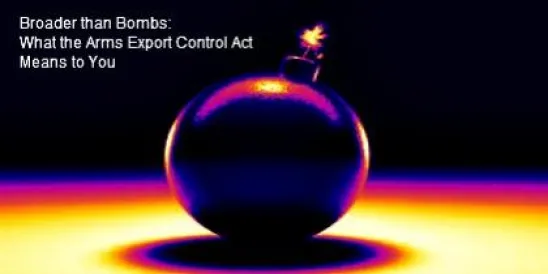As a business owner you likely never imagined that the Arms Export Control Act (“AECA”) and the International Traffic in Arms Regulation (“ITAR”) might apply to you and your business. But the broad scope of these laws can have a substantial effect on both and result in serious consequences. Congress enacted these laws during the Cold War to control the import and export of defense articles, including nuclear weapons, listed on the United States Munitions List (“USML”). The AECA gives the President the authority to control the export of defense articles, and ITAR then delegates the statutory authority to the Secretary of State. The Secretary of State then regulates the import and export of the items and services listed on the USML. Due to additional regulation of exports in the past decade, enforcement by the United States government of activities under AECA and ITAR increased noticeably. As a result, individuals and businesses involved with items or services on the USML need to be aware of the implications and requirements under AECA and ITAR. This article addresses: (i) items on the USML; (ii) the application and requirements of AECA and ITAR pursuant to inclusion on the USML; and (iii) suggested steps if violations have already occurred.
I. Items on the USML
Inclusion of a business’s activities on the USML requires compliance with ITAR and AECA; therefore, a business needs to initially determine if its activities fall under the USML. The USML lists all articles, services and related information regulated by AECA and defined as “defense” articles and services.1 Articles and services are placed on the USML when they “contribute to an arms race, aid in the development of weapons of mass destruction, support international terrorism, increase the possibility of outbreak or escalation of conflict, or prejudice the development of bilateral or multilateral arms control or nonproliferation agreements or other arrangements.” Additionally, this language creates a broad scope of inclusion and includes items such as certain sound equipment, detection devices and trailers.2
There are twenty categories of articles on the USML: (1) Firearms, Close Assault Weapons and Combat Shotguns; (2) Guns and Armament; (3) Ammunition/Ordnance; (4) Launch Vehicles, Guided Missiles, Ballistic Missiles, Rockets, Torpedoes, Bombs, and Mines; (5) Explosives and Energetic Materials, Propellants, Incendiary Agents, and their Constituents; (6) Vessels of War and Special Naval Equipment; (7) Tanks and Military Vehicles; (8) Aircraft and Associated Equipment; (9) Military Training Equipment; (10) Protective Personnel Equipment; (11) Military Electronics; (12) Fire Control, Range Finder, Optical, Guidance and Control Equipment; (13) Auxiliary Military Equipment; (14) Toxicological Agents, Including Chemical Agents, Biological Agents, and Associated Equipment; (15) Spacecraft Systems and Associated Equipment; (16) Nuclear Weapons, Design and Testing Related Items; (17) Classified Articles, Technical Data and Defense Services Not Otherwise Enumerated; (18) Directed Energy Weapons; (19) Submersible Vessels, Oceanographic and Associated Equipment; and (20) Miscellaneous.
While some items on the list are obvious, such as firearms, others are not so apparent. Less obvious items include clothing made with specific fabrics, certain radios, electronic spaceflight equipment, radiation detection devices, satellite antennas and oceanographic vessels. Even a partially completed article on the USML or a component used to create an item on the USML could be considered a defense article.3
II. Application and Requirements under AECA and ITAR
Once a business determines that its activity falls under the USML, ITAR and AECA are applicable. ITAR makes it unlawful to conspire, attempt to, or actually import or export any item listed on the USML without first obtaining a license or receiving written approval from the Office of Defense Trade Controls.4 To obtain either, your business must first register with the U.S. Department of State. Registration does not create export privileges; it only serves as a precondition for the license or other approval. Even if you only sell domestically, registration with ITAR is a requirement. There is a yearly registration fee, which starts at just over $2,000. Registration, even for domestic items, allows the government to have knowledge of and regulate all items and services on the USML within the United State’s borders. Once your business has registered, it can only sell USML articles and services domestically until the Department of State authorizes international exchange. If you plan to participate in international importing or exporting, you must obtain a license or written authority to conduct said activities. The most common ITAR State Department licenses are DSP-5: Permanent Export License, DSP-73: Temporary Export License, DSP-61: Temporary Import License and DSP-119: Modification of an Existing License. Applications for these licenses are available on the US State Department, Directorate of Trade Defenses’ Form website.5 As the licensing process can be complicated, and because strict compliance with ITAR is required, you are encouraged to contact an attorney experiences in this area to help you navigate the process.
Failure to obtain a license or receive written authorization is punishable by fine, imprisonment, or both.6 Each violation of the AECA can carry a sentence of 20 years in prison and a $1,000,000 fine. AECA violations have included a $15,000,000 fine7 for the foreign sale of a microchip8; a $100,000,000 fine for outsourcing a program that transferred night vision goggles, along with classified information, to engineers in Singapore and the United Kingdom9; and four (4) years in prison for exporting information contained in a United States Air Force contract.10
Further penalties may exist beyond high fines and prison sentences; violators can also face debarment11 and interim suspension.12 The basis for debarment is any conviction for violating or conspiracy to violate the AECA. If a party faces debarment, the Assistant Secretary of State for Political-Military Affairs determines the period for disbarment, which is typically three (3) years and may prohibit that party from participating in the export of defense articles indefinitely, even with a license. Once a disbarment period expires, reinstatement is not automatic.13 The government retains the ultimate power to determine whether or not to reinstate. If the Managing Director of the DDTC believes grounds for debarment exist, the Director may order interim suspension if interim suspension is reasonably necessary to protect world peace or U.S. foreign policy. An interim suspension order prohibits a party from participating in the export of any defense article or defense service.14 The party being suspended must be notified in writing, but an order may be given effect immediately, without prior notice. The maximum period for an interim suspension is 60 days, unless there are extraordinary circumstances.
III. Suggested Steps if Violations Have Already Occurred
If you failed to register or obtain the necessary license, there are some preventive steps to mitigate the possible penalties. First, we recommend you contact an attorney with experience in this specific area of law. With your attorney, you should discuss the opportunity to voluntarily disclose your violation.15 ITAR strongly encourages the disclosure of information to the Office of Defense Trade Controls by persons, firms or organizations believing they may have violated any part of the AECA, or of the regulations, order, or license authorization issued under AECA. Because failure to report a possible violation could be detrimental to national security and foreign policy interests, disclosures are highly favored, and a voluntary self-disclosure is considered a mitigating factor.
If you elect to voluntarily self-disclose, your next step is to promptly notify the Office of Defense Trade Controls in writing.16 Your initial written notification must include:
- A precise description of the nature and extent of the violation;
- A thorough explanation of why, when, where, and how the violation occurred;
- Identities and addresses of all individuals and organizations involved in the activities giving rise to the violation;
- Export license numbers;
- USML category, product descriptions, quantities, and characteristics of the items, services or technical data;
- Description of any corrective actions already assumed; and
- Name and address of the person or firm making the disclosure along with contact information.
Your written disclosure should include copies of documents authenticating the disclosure.17 These documents may include, but are not limited to, license applications, export licenses, end-user statements, shipper's export declarations, airway bills, bills of lading, and a certification stating that the representations made are true and correct to the best of that person's knowledge and belief.18
In conclusion, penalties are severe for businesses that violate the AECA. Avoid these penalties by registering and obtaining the proper licenses. And, if your business has run afoul, don’t panic, contact an experienced attorney to discuss steps to mitigate possible penalties.
_______________________________
(1) For a complete list of all articles, services and related data qualifying as “defense” according to AECA, go to 11 CFR § 121.1 (The General United States Munitions List) and 11 CFR § 121.2-16 for Interpretations of the Munitions List and details regarding items and services appearing on the General Munitions List (access to the electronic Code of Federal Regulations can be found at http://ecfr.gpoaccess.gov/cgi/t/text/text-idx?c=ecfr&tpl=%2Findex.tpl).
(2) 22 U.S.C.A. § 2778.
(3) 11 CFR § 121.1; In addition to the relevant statutes, the Defense Trade News published by the Center for Defense Trade is another great resource for specific items that qualify as defense articles or services.
(4) 11 CFR § 127.1
(5) http://pmddtc.state.gov/licensing/forms.html
(6) 11 CFR § 127.4
(7) 22 CFR § 127.10; See also “Five Individuals and One Tennessee Company Charged with Conspiracy to Violate Arms Export Control Act and Related Offenses in International Arms Trafficking Scheme,” Department of Justice Office of Public Affairs, February 8, 2011 (http://www.justice.gov/opa/pr/2011/February/11-crm-161.html).
(8) “Boeing Company Arms Export Control Act Violation(QRS-11 Gyrochip),” POGO.org. Federal Contractor Misconduct Database. http://www.contractormisconduct.org/index.cfm/1,73,222,html?CaseID=913. Retrieved 13 September 2010.
(9) http://biz.yahoo.com/ap/070327/itt_fine.html?.v=3 "ITT Fined $100M for Illegal Tech Exports" Tuesday March 27, 8:44 pm ET; Sue Lindsey, Associated Press Writer
(10) "Former University of Tennessee Professor John Reece Roth Sentenced to 48 Months in Prison for Illegally Exporting Military Research Technical Data". FBI. July 1, 2009. http://knoxville.fbi.gov/dojpressrel/pressrel09/ kx070109.html. Retrieved 13 September 2010.
(11) 22 CFR § 127.7
(12) 22 CFR § 127.8
(13) The debarred party must submit a request for, and be approved for, reinstatement.
(14) The order will state the relevant facts, the grounds for issuance of the order, and describe the nature and duration of the interim suspension.
(15) § 127.12
(16) This disclosure should be followed by a review of the suspected violation.
(17) Usually an oral presentation is not included. However, if a party wishes to give an oral presentation, a request for one should be included with the written disclosure.
(18) Representation made by a firm, corporation or any other organization must be made by an individual with the authority to do so.



 />i
/>i

